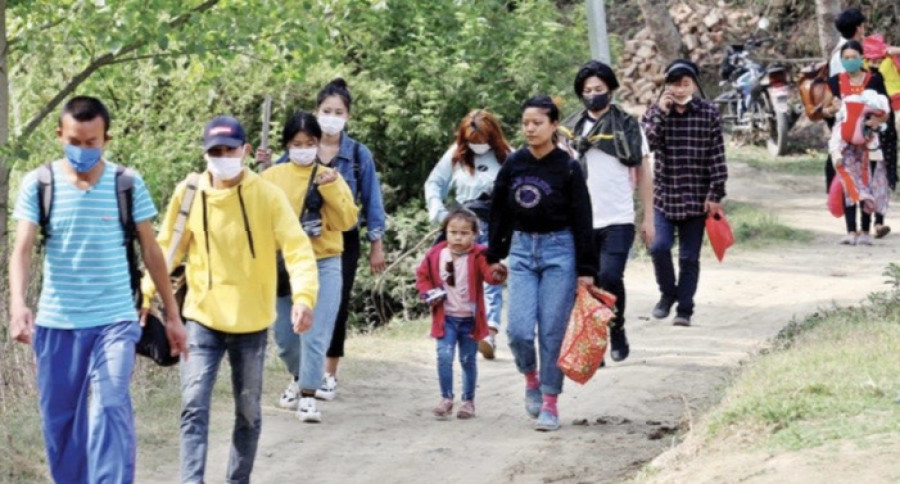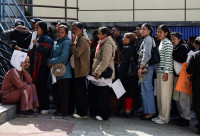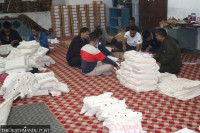National
The pandemic is reinforcing social inequalities
For minority groups already suffering under various inequalities, the pandemic and the lockdown are already furthering their marginalisation.
Aditi Aryal
On the second day of the lockdown, Ganesh Tamang began the long walk home. With just three packets of instant noodles in his bag, Tamang walked more than 80 kilometres to his home in Makwanpurgadhi. At least there, he knew he wouldn’t starve to death.
Tamang works in Kathmandu as a daily-wage labourer in the construction industry and he lives hand to mouth.
“After the middleman takes his cut for finding me a job for the day, I am left with very little money,” Tamang told the Post over the phone from Makwanpurgadhi. “Surviving the lockdown in Kathmandu would have been very difficult for me as I have not been able to save anything.”
Tamang might be home but things look bleak. He came to Kathmandu to work and send back money to his family. Without a steady source of income, his family is likely to tread the poverty line, subsisting on very little and forced to take loans.
The lockdown, imposed by the Nepal government since March 24, is likely to serve its purpose of helping to prevent the spread of Covid-19, but it is going to affect people like Tamang disproportionately. Daily wage workers and those on the lower end of the socio-economic spectrum will suffer more, losing jobs and getting into more debt.
The World Bank has already warned that “the pandemic will hit hard low-income people, especially informal workers in the hospitality, retail trade, and transport sectors who have limited or no access to healthcare or social safety nets” and that the COVID-19 shock will likely reinforce inequality in South Asia.”
“The upper socio-economic strata have more economic and physical resources, translating to more social benefits, at their disposal,” said sociologist Sanjay Sharma. “Pandemics like these present a clearer picture of the inequalities that are prevalent in our society.”
The luxury of working from home, attending online classes, and ordering groceries for home delivery is only available to the privileged few. Those without jobs and savings are solely dependent on the government’s relief packages and the kindness of strangers.
Daily wage workers and those who are part of the informal economy already suffer from numerous inequalities, including access to healthcare, sanitation and education, which manifests in malnutrition, a lower human development index, and social discrimination and exclusion.
Meena, who works around Kathmandu as domestic help,was not paid last month and all of her employers have asked her not to come by. With her savings running out, she went to collect relief from the ward office in Gyaneshwor. But the packaged food items she received had been tampered with, she told the Post.
“They [officials] had taken a share from our relief before giving it to us,” said Meena, who asked that she only be identified by her first name. But she wasn’t able to say anything and quietly take the food, as any argument might have deprived her of even the little relief.
Meena’s daughter-in-law, who also works as domestic help, has not received any relief because she lacks proof of citizenship as her parents weren’t legally married when she was born and when she grew up, they weren’t around, she said.
Nearly 25 percent of the adult population is estimated to lack citizenship certificates by the Forum for Women, Law and Development, a rights organisation. A majority of this stateless population is ineligible to receive any benefits from the state since they have no form of identification. A lack of citizenship proves to be an obstacle throughout their lives but the effects are exacerbated in times of crisis like this.
For minority groups, crises like the ongoing Covid-19 pandemic can be doubly marginalising.
Over the years, sexual minorities belonging to the LGBTIQ community have migrated to Kathmandu to escape ostraicisation and discrimination back home. But Kathmandu is no safe haven and it is difficult for them to find jobs, leading them to work as bar dancers, or in the sex trade.
“As restaurants and bars are shut, a majority of them are out of work and fear of the coronavirus has hit the sex industry,” said Pinky Gurung, chairperson of Blue Diamond Society, an organisation that works for the rights of sexual minorities.
Accessing governmental relief is also difficult for many LGBTIQ members, especially transgender individuals, who might lack up-to-date identification documents.
“Viruses also spread easily in our community but the government often overlooks the needs of the third gender,” said Gurung. “Already susceptible to violence and discrimination throughout the year, such oversights make us realise how vulnerable we actually are.”
Years of caste-based discrimination have also resulted in a social composition where marginalised groups are also the poorest social groups, according to Sharma. Many marginalised communities are forced to live in one-room shacks and in close proximity with each other, such as in slums and low-income settlements.
“These groups have no access to basic facilities, including healthcare, and practising social distancing is rarely possible due to compact settlements and a big family size,” he said. “If Covid-19 breaks out in such settlements, they will be the worst hit in the society”.
According to research by the UK’s Department for International Development, 22 percent of the Nepali population does not have access to healthcare and they mostly comprise Dalit and Muslim communities.
Social distancing is considered a protective measure against the spread of the coronavirus, but Nepali society has long practised an extreme form of social distancing, in practices such as untouchability and chhaupadi, which affect the most marginalised of communities, Dalits and women.
“In my village in Tanahun, barricades have been put in order to prevent people from moving from one place to another. When so-called ‘lower’ caste groups have to cross such barricades to conduct their daily businesses, they are denied entry and asked to go away,” said Tika Kaini, assistant professor of anthropology at Tri-Chandra College.
As per Kaini, people on the lowest rung of the socio-economic ladder, like daily wage labourers and domestic help, are prone to such mistreatment.
“They work multiple jobs which increases their contact with a large number of people. This places them at high risk of contracting the disease,” said Kaini. “But it also becomes a reason for their employers and other members of society to maintain distance, reinforcing the practice of untouchability.”




 22.17°C Kathmandu
22.17°C Kathmandu














